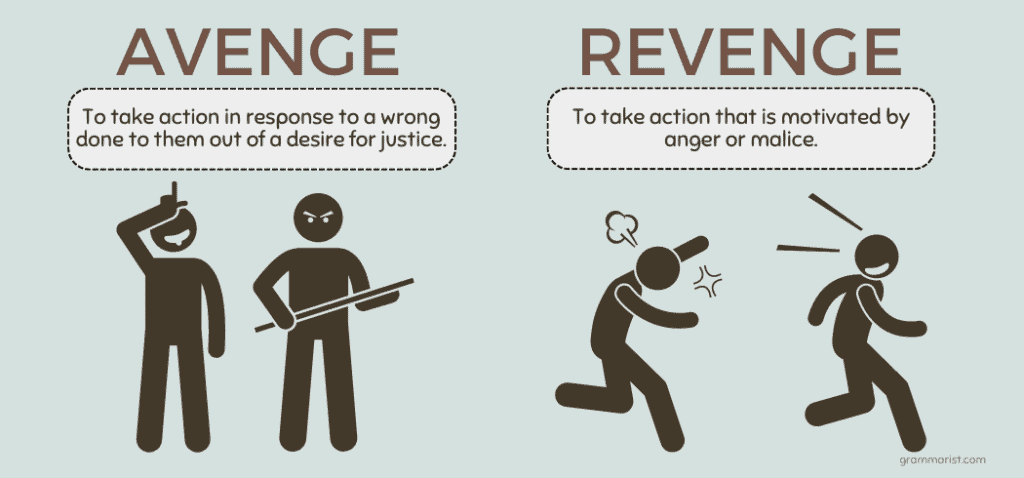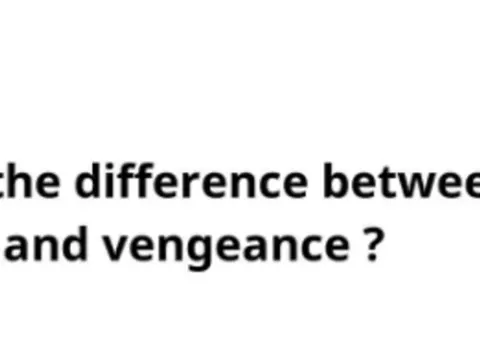Revenge and vengeance are two words that many people have heard of but few can differentiate between them. It’s important to understand the nuances between the concepts behind the two words.
Revenge is an act of rebellion taken after someone has hurt you, it’s driven by anger and emotions to make someone suffer for your satisfaction. Whereas, vengeance is a just action taken to hold someone accountable for their wrong actions.
That’s just a gist of the discussion, as you read on there’s more to discover and learn. So, let’s start!
Learning The Real Meanings
To start off, revenge refers to taking action in order to get back at someone who has wronged you. It is an act of rebellion and a way of seeking restoration or balance after an injustice has been done.
You could think of it as a form of justice, albeit one driven by emotion rather than logic.
Vengeance, on the other hand, is a more extreme form of retribution. It involves exacting punishment that is not necessarily proportional to the offense but rather seeks to inflict as much misery as possible onto its target.
While revenge is motivated by anger, vengeance tends to be driven by hate and an urge for domination over your adversary.
What Is the Difference Between Revenge and Vengeance?
Revenge and vengeance may seem very similar, but there is an important distinction to be understood between the two.
In short, vengeance is retribution for a wrong committed deed while revenge is more focused on inflicting harm in response to the wrong.
Vengeance is often motivated by a desire to restore balance and justice, while revenge seeks to cause harm to an enemy as a way of exacting “punishment.”
It can also be organized into three distinct areas of action: retributive, deterrent, and preventive.
Retributive justice focuses on imposing punishment on an offender in order to prevent future wrongdoings.
Deterrence serves as a warning to others not to commit similar offenses through fear of being caught or suffering punishments.
Prevention is carried out with the goal of stopping future offenses from occurring altogether by either correcting underlying social causes or by removing potential offenders from society entirely.
The Role Of Retribution in Revenge and Vengeance
When it comes to revenge and vengeance, another factor to consider is the role of retribution.
It’s crucial to note that vengeance seeks retribution as a way of correcting a wrong or restoring balance, while those seeking revenge do it in an effort to cause harm or effect punishment.
So what does this mean in practice? Here’s what you need to know:
- Vengeance is about restoring justice for a wrong by punishing the wrongdoer, while revenge is primarily focused on obtaining satisfaction from inflicting pain or suffering on the wrongdoer.
- Vengeance often involves an attitude of moral superiority where the avenger believes they have been unfairly harmed and feels justified in seeking retribution, whereas someone who seeks revenge has no such moral authority and instead acts out of a strong emotional desire for payback.
- Retribution may be sought by either party in both cases, but often with different intentions – vengeance could be seen as “justified punishment,” while revenge might be seen as unjustified or an unbalanced reaction.
When it comes to revenge and vengeance, there are some nuanced differences that can be hard to wrap your head around. While revenge and vengeance might seem like two sides of the same coin, there is actually a lot more to it than that.
A vengeance is an act of retribution triggered by a desire for payback for an injury or wrong. It’s not blind rage, it’s based on much more thought and calculation.
Revenge is usually done with some degree of restraint, with the intention of causing emotional or physical pain without permanently injuring the other party.

Revenge takes things a step further than vengeance it involves inflicting significant emotional or physical harm on another person.
It goes beyond retribution because the goal is to cause suffering and pain through punishment or retaliation in order to balance out the injustice suffered by the other person. Unlike vengeance, revenge isn’t done out of a desire for justice; it’s done out of hate.
It can be difficult to tell the difference between revenge and vengeance without having context it all comes down to motivation and intention.
Taking action in order to bring justice can be considered vengeance, but if it’s fueled by hatred then it becomes revenge.
Alternatives To Reach Resolution Without Descent Into Revenge
In an ideal world, we could find a way to reach a resolution without resorting to either revenge or vengeance. In this case, you can strive for that middle ground between the two.
Forgiveness

The first step in finding an alternative to revenge or vengeance is learning how to forgive. As trite as that might sound, it’s essential for healing.
Forgiving doesn’t mean forgetting; instead, it’s an intentional effort to let go of that deep-seated hurt and anger and open up your heart again while still allowing yourself time to heal.
Compassion
Compassion is another option when it seems like revenge or vengeance might be the only recourse.
It allows us to see beyond our own pain and suffering, into the lives of those who have wronged us, understanding that we are all living with our own challenges and baggage.

The Psychology Behind Revenge And Vengeance
When it comes to revenge vs. vengeance, the feelings that drive us to seek one or the other can be intense.
Vengeance
Vengeance is brought by a belief that justice needs to be restored. It’s an attempt to repair any damages done and punish those responsible for the wrongs that have been done.
When feelings of injustice are present, attempting to restore balance through vengeance can offer us a sense of satisfaction and accomplishment because we become empowered in our quest for justice.
Revenge
Revenge is driven by more primal emotions anger and hatred than vengeance is, and it doesn’t have any real purpose other than hurting someone who has hurt you.
It’s deeply rooted in negative emotions like resentment, jealousy, and rage, which can lead to destructive behavior (both physical and verbal).
In short, revenge won’t fix anything or heal any wounds; instead, it only serves to fuel further animosity between the two parties involved.

Revenge And Vengeance In Literature And Pop Culture
Revenge and vengeance have made their way into literature and pop culture, but how do they differ? That’s something that many of us might not know.
So, let’s look at what makes revenge and vengeance different when it comes to storytelling.
Revenge
In literature and films, the protagonist often seeks revenge as a response to wrongs inflicted by another person or group. It’s usually an emotional response to a perceived injustice and is usually more personal than vengeance.
Vengeance
Vengeance, however, typically involves punishing someone else for a crime they committed against you. It can be part of an ongoing cycle of violence that can perpetuate throughout the story or film.
Unlike vengeance, revenge doesn’t aim to provide restitution it’s typically rooted in hatred or anger instead.
Whether it’s Shakespeare’s Hamlet or Marvel’s The Avengers films, revenge, and vengeance appear in various forms within literature and films today. However, understanding the nuances between them can help us get a better appreciation for these popular works.
Revenge And Vengeance In History
It’s not uncommon to hear tales of revenge and vengeance in history. From The Odyssey to the Old Testament, stories of people taking things into their own hands after experiencing wrongs against them abound.
Even today, there are many examples of both revenge and vengeance, from the criminal justice system to historic figures like Alexander the Great, who sought revenge on those who had wronged him.
Examples of Vengeance in History
Here are some famous examples from history:
- After the fall of Troy in Homer’s Odyssey, Odysseus avenges the suitors who invaded his home and demanded his wife’s hand in marriage while he was away at war.
- In medieval Britain, William Shakespeare’s play King Lear tells the story of a king who is betrayed by his two daughters and avenges them by refusing to give them their inheritance.
Examples of Revenge in History
Revenge is different than vengeance because it involves punishing someone beyond what would be appropriate or justifiable retribution for a wrong that has been done to you or someone else.
It can be seen as an act that goes beyond “getting even” and is often motivated by feelings such as hatred or anger. Here are some famous examples from history:
- In Greek mythology, Zeus takes revenge on humanity for Prometheu’s stealing.
- Julius Caesar took revenge on pirates by crucifying them after they had kidnapped him and made him pay the ransom.

Moving Forward: Choosing Not To Seek Revenge Or Vengeance
It’s easy to feel anger, hurt, and a desire for revenge in the aftermath of an offense. But seeking revenge or retaliation rarely ever helps–in fact, it often leads to more pain and suffering.
So how can you move forward without going down that road?
Focus on yourself
Rather than dwelling on the offense and who wronged you, try shifting your focus to yourself instead. Do something kind for yourself, like taking a bubble bath, eating a comforting meal, or reading a book.
These things will help you focus on caring for and nurturing yourself instead of getting stuck in a cycle of ruminating on the incident.
Practice acceptance
When we experience an offense of some kind that leaves us feeling wronged, it’s natural to want to fight back–but sometimes the best response is acceptance.
Try letting go of your attachment to certain outcomes or expectations by accepting what happened as an unavoidable part of life and working towards forgiving whoever wronged you (even if that person never apologizes). Ultimately, this will help lead you closer to inner peace.
Create positive experiences
When we experience negative emotions like anger and hurt after a perceived offense, it can be helpful to create positive experiences in our lives–experiences that remind us life isn’t always full of pain and suffering.
Spend time with people who bring out the best in you and make your heart sing. Reach out to people who care about you or talk to your loved ones!
FAQs
What is a reasonable definition of revenge?
Revenge is seen as an act of retaliation with the intention to hurt someone in response to a wrong action that has been committed against oneself or someone else.
Is revenge justified?
The answer to this question will depend on your personal perspective, values, and principles. There is no universal right or wrong answer here—what one person might believe is justified revenge, another person may not agree with it at all.
Is vengeance the same as retribution?
No, these terms are not synonymous.
Vengeance involves seeking a personal form of justice for one’s own benefit or satisfaction whereas, retribution is more closely connected to justice and tends to involve punishment for a wrong action imposed by an independent party or authority figure rather than the person who has been wronged seeking it out for themselves.
Conclusion
- Whether you’re considering taking revenge or seeking vengeance, it’s important to know the difference between the two and understand the implications of each.
- Revenge is typically motivated by returning harm with the intention of causing pain and can involve violence, while vengeance is more focused on justice, often involving the law to address a wrong.
- The law, however, is not always just, and revenge can often be warranted in cases of injustice.
- Ultimately, when considering revenge and vengeance, the best course of action is to think before you act.
- Revenge is a powerful force and can be useful for empowering ourselves, but it is rarely a long-term solution.
- Vengeance, on the other hand, can be a tool for justice that often involves less destruction and contributes to the greater good.

